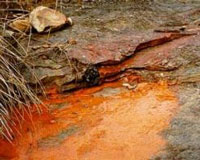
Top stories





ICTVodafone teams up with Amazon's satellites to connect masts in Europe and Africa
Paul Sandle 12 minutes

More news










Logistics & Transport
Maersk reroutes sailings around Africa amid Red Sea constraints






But South African academics and scientists have been hard at work on solutions to tackle the corrosive mining by-product, and one has successfully applied for, and received, a United States patent for an acid mine water treatment process.
Professor Jannie Maree, Rand Water chair in water utilisation in Tshwane University of Technology's Faculty of Science, says the magnesium-barium-hydroxide (MBO) process, which removes metals and sulphate from mine water, offered South Africa a technically sound and cost-effective solution for the acid mine water problem.
Acid mine drainage is highly acidic water, usually containing high concentrations of metals, sulphides and salts from mining. This acid runoff also dissolves heavy metals such as copper, lead and mercury into ground or surface water, threatening the health of rivers by disrupting aquatic organisms' growth and reproduction. Further problems include the acidic runoff corroding infrastructure like bridges. Most importantly though, the drainage pollutes groundwater, which contributes to the drinking water supply. In a water-poor country like South Africa this poses a significant problem.
So much so that in his 2012 State of the Nation address South Africa's President Zuma said that R248-million was to be invested over the next two years to deal with acid mine drainage on the Witwatersrand, an extensively mined area in the Greater Johannesburg Metropolitan Area in the province of Gauteng.
Gold mining began in 1886 on the Witwatersrand, which stretches 50km from Krugersdorp to the west, to Boksburg to the east. From the 1950s mines across the region started closing down and the last remaining operational mine, East Rand Propriety Mines in Boksburg, closed its operations in 2008.
During the mining period, there was infrastructure in place to pump water out of the mines. But as they closed down, the underground voids created from mining operations have filled up as the pumps have ceased. Accumulated water has also flowed into adjacent mines, filling up the entire void.
Maree said removing metals and sulphate with the MBO process could produce water that contained levels low enough to be acceptable as drinking water. "This was provided the levels of sodium and chloride in the treated water was low."
He added that the "patented process was used with great success at laboratory level", where water from coal and gold mines was used. The success of the process success was recorded in Tshwane University of Technology (TUT) postgraduate student Hangwi Bologo's master's dissertation.
Maree describes the income-generating side to the process, saying "the saleable products from the process would be sulphur, calcium carbonate and the treated water. Depending on the water quality other saleable compounds could be metals and magnesium hydroxide."
He adds: "SA imports its sulphur. Sulphuric acid is produced from sulphur which is an important raw material in the manufacturing of fertiliser."
Another academic working on, among others, the acid mine drainage problem, Professor Sunny Iyuke of the University of the Witwatersrand School of Chemical and Metallurgical Engineering, has, with the help of PhD students, developed a membrane to separate waste from water. The membrane has applications across industry, water purification and even medicine.
According to Iyuke the membrane (similar to a household water filter) could be used to catch water waste from mines before it entered drains or the water table.
MediaClubSouthAfrica.com is hosted by the International Marketing Council of South Africa (IMC), the custodian of Brand South Africa. The site is a free service for all media professionals - journalists, editors, writers, designers, picture editors and more - as well as for non-profit organisations and private individuals. Its specific focus is on South Africa and Africa.
Go to: http://www.mediaclubsouthafrica.com/